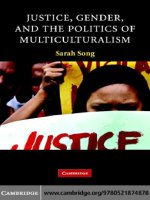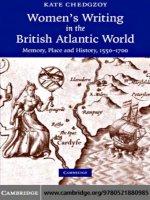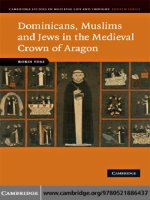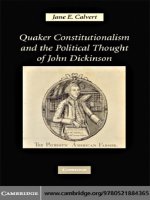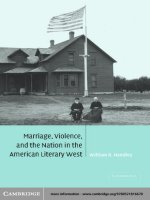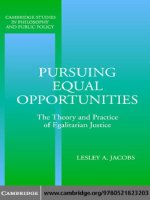0521870062 cambridge university press hobbes bramhall and the politics of liberty and necessity a quarrel of the civil wars and interregnum nov 2007
Bạn đang xem bản rút gọn của tài liệu. Xem và tải ngay bản đầy đủ của tài liệu tại đây (2.72 MB, 356 trang )
This page intentionally left blank
Hobbes, Bramhall and the Politics of Liberty and Necessity
This is the first full account of one of the most famous quarrels of the seventeenth century,
that between the philosopher Thomas Hobbes (1588–1679) and the Anglican archbishop
of Armagh, John Bramhall (1594–1663). This analytical narrative interprets that quarrel within its own immediate and complicated historical circumstances, the Civil Wars
(1638–1649) and Interregnum (1649–1660). The personal clash of Hobbes and Bramhall
is connected to the broader conflict, disorder, violence, dislocation and exile that characterised those periods. This monograph offers not only the first comprehensive narrative
of their hostilities over two decades, but also an illuminating analysis of aspects of their
private and public quarrel that have been neglected in previous biographical, historical
and philosophical accounts, with special attention devoted to their dispute over political
and religious authority. This will be essential reading for scholars of early modern British
history, religious history and the history of ideas.
n i c h o l a s d . j a c k s o n was a University Fellow at the Maxwell School of Citizenship
and Public Affairs, Syracuse University, from 1997 to 2005.
Cambridge Studies in Early Modern British History
Series editors
anthony fletcher
Emeritus Professor of English Social History, University of London
john guy
Fellow, Clare College, Cambridge
john morrill
Professor of British and Irish History, University of Cambridge, and
Fellow, Selwyn College
This is a series of monographs and studies covering many aspects of the history of the
British Isles between the late fifteenth century and the early eighteenth century. It
includes the work of established scholars and pioneering work by a new generation of
scholars. It includes both reviews and revisions of major topics and books which open
up new historical terrain or which reveal startling new perspectives on familiar subjects.
All the volumes set detailed research into our broader perspectives, and the books are
intended for the use of students as well as of their teachers.
For a list of titles in the series, see end of book.
HOBBES, BRAMHALL
AND THE POLITICS
OF LIBERTY AND
NECESSITY
A Quarrel of the Civil Wars
and Interregnum
NICHOLAS D. JACKSON
CAMBRIDGE UNIVERSITY PRESS
Cambridge, New York, Melbourne, Madrid, Cape Town, Singapore, São Paulo
Cambridge University Press
The Edinburgh Building, Cambridge CB2 8RU, UK
Published in the United States of America by Cambridge University Press, New York
www.cambridge.org
Information on this title: www.cambridge.org/9780521870061
© Nicholas D. Jackson 2007
This publication is in copyright. Subject to statutory exception and to the provision of
relevant collective licensing agreements, no reproduction of any part may take place
without the written permission of Cambridge University Press.
First published in print format 2007
eBook (EBL)
ISBN-13 978-0-511-35448-9
ISBN-10 0-511-35448-7
eBook (EBL)
hardback
ISBN-13 978-0-521-87006-1
hardback
ISBN-10 0-521-87006-2
Cambridge University Press has no responsibility for the persistence or accuracy of urls
for external or third-party internet websites referred to in this publication, and does not
guarantee that any content on such websites is, or will remain, accurate or appropriate.
It was . . . the seditious tenets of Mr Hobbes, and such like, which opened a large
window to our troubles. . . . They are T. H. his own principles . . . which do serve to
involve nations in civil wars.
John Bramhall, Archbishop of Armagh (1594–1663) (BW, iv, 219, 391)
He [Bramhall] further says that ‘just laws are the ordinances of right reason’; which
is an error that hath cost many thousands of men their lives.
Thomas Hobbes of Malmesbury (1588–1679) (EW, v, 176)
All books of controversies should be writ in Latin, that none but the learned may
read them, and that there should be no disputations but in schools, lest it breed
factions amongst the vulgar, for disputations and controversies are a kind of civil
war, maintained by the pen, and often draw out the sword after.
William Cavendish, Duke of Newcastle (1592–1676)
(Life of Cavendish, 125)
CONTENTS
Acknowledgments
List of abbreviations
Note on dates and style
page ix
xi
xvii
Introduction
1
1 Bishop Bramhall, the ‘Great Arminian’, ‘Irish Canterbury’
and ‘Most Unsound Man in Ireland’, 1633–1641
21
2 Bishop Bramhall, the Earl of Newcastle, Thomas Hobbes and
the First English Civil War
40
3 Hobbes’s flight to France, De Cive and the beginning of the
quarrel with Bramhall, summer 1645
68
4 An epistolary skirmish, 1645–1646: Bramhall’s ‘Discourse’,
Hobbes’s ‘Treatise’ and Bramhall’s ‘Vindication’
100
5 Bramhall and the royalist schemes of 1646–1650
125
6 Hobbes and Leviathan among the exiles, 1646–1651
146
7 The public quarrel: Hobbes, Of Liberty and Necessity, 1654,
Bramhall, Defence of True Liberty, 1655 and Hobbes,
Questions concerning Liberty, Necessity and Chance, 1656
180
8 Castigations of Hobbes’s Animadversions and The Catching
of Leviathan, 1657–1658: Hobbes as Leviathan of Leviathans
220
9 The Restoration and death of Bramhall and Hobbes’s last
word, 1668
250
Conclusion
276
Bibliography
Index
305
323
vii
ACKNOWLEDGMENTS
No reader of this book’s footnotes will be able to overlook my debt to dozens
of scholars. Here, however, I would like to specify those to whom my gratitude is especially great. For my understanding of Bramhall’s career in Ireland
in the 1630s I am much indebted to John McCafferty. He allowed me to
read a draft of his article on Bramhall for the Oxford Dictionary of National
Biography. Like so many others who have studied Hobbes in the last decade,
my debt to Noel Malcolm is considerable. I thank Nicholas Tyacke, whose
scholarship was enormously helpful in sketching the arminian-calvinist context of the Hobbes–Bramhall quarrel. Similarly, I would like to express gratitude to Lisa Sarasohn, whose work on Hobbes and Newcastle proved a good
guide. All of the following scholars either answered queries, shared sources
and unpublished writings, supplied images or offered advice and encouragement. Some of them did all of the above. They are: Marika Keblusek,
Jack Cunningham, Thomas Pink, David Smith, Anthony Milton, Nicole
Greenspan, David Sturdy, Nicholas Rogers and Jeffrey Collins. While I have
disagreed with the latter in some points, his meticulous Hobbes scholarship
has served as a model for my own. Early in this publishing venture, John
Morrill’s support and enthusiasm inspired diligent revision. I also thank the
Press’s anonymous reader who offered trenchant criticism and constructive
suggestions for revision. At Cambridge I was fortunate to have been managed
by a talented editor, Michael Watson. His nudging was always experienced
as charm for the grace with which it was applied.
This book began as a dissertation. While it was still in that form it benefited
from the reading of several historians at Syracuse University. For their perusal
and criticism I thank Ralph Ketcham, Chris Kyle and Pamela Edwards. I am
even more indebted to one of their fellow examiners, Gordon Schochet. His
exceptional generosity began when he agreed to serve as a member of my
dissertation committee. Not deserving that, I have been even more undeserving of all the subsequent attention he has paid to my work. My acquaintance
with Dr Schochet has allowed me to understand how sincerely Hobbes must
have thanked patrons like the Cavendishes.
ix
x
Acknowledgments
One of the more powerful incentives to publish a book is to obtain the
opportunity to thank in public all those who have sustained the writer over
many years of toil. I am heavily indebted to an advisor and mentor who
has also proved a friend. I thank Joseph Levine not only for his critical
tenacity while this was still being written as a dissertation (and before that,
a seminar paper), but equally, more generally, for all the personal guidance
and care I did not deserve as his graduate student. My gratitude to him is
especially great for supporting me on all those occasions when even I would
not support myself. My family, too, has supported me many times when I
was thoroughly undeserving. I thank Brandon and Mary Jackson, whose
hospitality and generosity at Little Spigot in West Witton allowed me to
research Bramhall’s career in Yorkshire. To another aunt, Gillian White, and
her family in London, I am even more indebted. While my gratitude to her,
Deborah, Jonathan, and Daniel is manifold, they shall be most amused for
thanking them for pretending that I was not mad to be devoting most of my
existence to resuscitating a dead man from Pontefract named John Bramhall.
In the same way I must thank all my siblings (JJKLNSSMSBG) who have,
for so long, suffered a scholar so gladly.
Lastly, and the opposite of leastly, I thank my parents. It would be no
exaggeration to say that they have been this book’s and this author’s sine qua
non. During its entire existence, first as a dissertation, then as a manuscript,
finally as a typescript, this book has benefited from my father’s historical
acumen, critical scrutiny and editorial prowess. I wish many others knew
what he knows: that such a description only scrapes the surface. Likewise,
any description of the love and support my mother has provided would be
absurdly insufficient. To state all the things for which I am indebted to my
parents would be as difficult – and long – as was the writing of this book. Like
all those who cannot find satisfactory words to express gratitude, I dedicate
this book to them.
A B B R E V I AT I O N S
Advice to Charles II = William Cavendish, Duke of Newcastle, Ideology
and Politics on the Eve of Restoration: Newcastle’s Advice to Charles II,
ed. Thomas P. Slaughter (Philadelphia: American Philosophical Society,
1984).
AH = John Vesey, ‘Athanasius Hibernicus: or, The Life of the Most
Reverend Father in God, John, Lord Archbishop of Armagh, Primate and
Metropolitan of all Ireland’ in Works of the Most Reverend Father in
God, John Bramhall, D. D., late Lord Archbishop of Armagh, Primate
and Metropolitan of all Ireland (Dublin, 1676), i–xliv.
‘An Answer’ = Hobbes, ‘An Answer to Bishop Bramhall’, EW, iv, 283–384.
Answer to Milleti`ere = Bramhall, An Answer to M. de la Milleti`ere, his
impertinent Dedication of his imaginary Triumph (entitled ‘The Victory
of Truth’), or his Epistle to the King of Great Britain King Charles II,
BW, i, 7–81.
Anti-White = Hobbes, Thomas White’s ‘De Mundo’ Examined, trans.
Harold Whitmore Jones (London: Bradford University Press, 1976).
Athenae Oxonienses = Anthony Wood, Athenae Oxonienses, ed. Phillip
Bliss (London, 1813–20; 4 vols.).
Aubrey, Brief Lives = John Aubrey, Brief Lives, Chiefly of Contemporaries,
Set Down by John Aubrey, Between the Years 1669 & 1696, ed. Andrew
Clark (Oxford, 1898; 2 vols.).
Baillie, Letters and Journals = Robert Baillie, The Letters and Journals of
Robert Baillie, ed. David Laing (Edinburgh, 1841–2; 3 vols.).
Behemoth = Hobbes, Behemoth, or the Long Parliament, ed. Ferdinand
Toennies (1889); intro. Stephen Holmes (Chicago and London:
University of Chicago Press, 1990).
xi
xii
List of abbreviations
Bodl. = Bodleian Library, Oxford University.
BL = British Library, London.
Brief View = Edward Hyde, Earl of Clarendon, A Brief View and Survey of
the Dangerous and Pernicious Errors to Church and State, in Mr
Hobbes’s Book Entitled Leviathan (Oxford, 1676).
BW = The Works of the Most Reverend Father in God, John Bramhall, ed.
A. W. Haddan (Oxford: John Henry Parker, 1842–5; 5 vols.).
Carte = A Collection of Original Letters and Papers, concerning the
Affairs of England, from the Year 1641 to 1660, found among the Duke
of Ormonde’s Papers, ed. Thomas Carte (London: James Bettenham,
1739; 2 vols.).
Castigations = Bramhall, Castigations of Mr Hobbes his Last
Animadversions in the Case concerning Liberty and Universal Necessity;
wherein all his exceptions about the controversy are fully satisfied,
BW, iv, 197–506.
Catching = Bramhall, The Catching of Leviathan, or the Great Whale,
BW, iv, 507–97.
CCSP = Calendar of the Clarendon State Papers preserved in the Bodleian
Library, eds. O. Ogle, W. H. Bliss, W. D. Macray and F. J. Routledge
(Oxford: Clarendon, 1869–1970; 5 vols.).
CD = Constitutional Documents of the Puritan Revolution, ed. S. R.
Gardiner (3rd edn, Oxford: Clarendon, 1906).
CJ = Journals of the House of Commons.
CJI = Journals of the House of Commons, Ireland.
Clarendon, History of Rebellion = Edward Hyde, Earl of Clarendon, The
History of the Rebellion and Civil Wars in England, ed. W. D. Macray
(Oxford: Clarendon, 1888; 6 vols.).
Considerations = Hobbes, Considerations upon the Reputation, Loyalty,
Manners, and Religion of Thomas Hobbes of Malmesbury, EW, iv,
409–40.
Corr. = The Correspondence of Thomas Hobbes, ed. Noel Malcolm
(Oxford: Clarendon, 1994; 2 vols.).
CSP = Calendar of State Papers.
CSPD = Calendar of State Papers, Domestic.
List of abbreviations
xiii
CSPI = Calendar of State Papers, Ireland.
DC = Hobbes, De Cive, On the Citizen, trans. Michael Silverthorne,
ed. Richard Tuck (Cambridge: Cambridge University Press, 1998).
Defence = Bramhall, A Defence of True Liberty from Antecedent and
Extrinsecal Necessity, being an answer to a late book of Mr Thomas
Hobbes of Malmesbury, entitled, A Treatise of Liberty of Liberty and
Necessity, BW, iv, 3–196.
Dialogue between a Philosopher and a Student = Hobbes, A Dialogue
between a Philosopher and a Student, of the Common Laws of England,
ed. Joseph Cropsey (Chicago and London: University of Chicago Press,
1971).
‘Discourse’ = Bramhall, ‘A Treatise of Liberty and Necessity upon
Occasion of Some Opinions of Thomas Hobbes about these’, BW, iv,
3–196.
DNB = Dictionary of National Biography, eds. Leslie Stephen and Sidney
Lee (London, 1885–1900; 63 vols.).
Elements of Law = Hobbes, The Elements of Law, Natural and
Politic/Human Nature and De Corpore Politico, ed. J. C. A. Gaskin
(Oxford: Oxford University Press, 1994).
Evelyn, Diary and Correspondence = Diary and Correspondence of John
Evelyn, F. R. S., to which is subjoined The Private Correspondence
between King Charles I and Sir Edward Nicholas and between Sir
Edward Hyde, afterwards Earl of Clarendon and Sir Richard Browne,
ed. William Bray (London: George Bell & Sons, 1906; 4 vols.).
EW = The English Works of Thomas Hobbes of Malmesbury, ed. William
Molesworth (London: J. Bohn, 1839–45; 11 vols.).
Fair Warning = Bramhall, A Fair Warning to take heed of the Scottish
Discipline, as being of all others most injurious to the Civil Magistrate,
most oppressive to the Subject, most pernicious to both, BW, iii, 237–87.
HJ = Historical Journal.
HMC Cowper = Historical Manuscripts Commission Report (12),
Appendix, Part ii, on the Manuscripts of Earl Cowper, K. G., preserved
at Melbourne Hall, Derbyshire, vol. ii (London: Eyre and Spottiswoode,
1888).
HMC Hastings, iv = Historical Manuscripts Commission Report (78) on
the Manuscripts of the late Reginald Rawdon Hastings, Esq., of the
xiv
List of abbreviations
Manor House, Ashby de la Zouch, vol. iv, ed. Francis Bickley (London:
HMSO, 1947).
HMC Ormonde(a), i = Historical Manuscripts Commission Report (14),
Appendix, Part vii: The Manuscripts of the Marquess of Ormonde,
preserved at the Castle, Kilkenny, vol. i, ed. John T. Gilbert (London:
Eyre and Spottiswoode, 1895).
HMC Ormonde(b), i = Historical Manuscripts Commission Calendar of
the Manuscripts of the Marquess of Ormonde, K. P., preserved at
Kilkenny Castle, New Series, vol. i, ed. C. Litton Falkiner (London:
Mackie and Co., 1902).
HMC Pepys = Historical Manuscripts Commission Report (70) on the
Pepys Manuscripts, preserved at Magdalene College, Cambridge, ed.
E. K. Purnell (London: HMSO, 1911).
HMC Portland, i = Historical Manuscripts Commission Report (13) on
the Manuscripts of His Grace the Duke of Portland, preserved at
Welbeck Abbey, vol. i, ed. F. H. Blackburne Daniell (London: Eyre and
Spottiswoode, 1891).
HMC Portland, ii = Historical Manuscripts Commission Report (13) on
the Manuscripts of His Grace the Duke of Portland, preserved at
Welbeck Abbey, vol. ii, ed. F. H. Blackburne Daniell (London: Eyre and
Spottiswoode, 1893).
HMC Portland, iii = Historical Manuscripts Commission Report (13) on
the Manuscripts of His Grace the Duke of Portland, preserved at
Welbeck Abbey, vol. iii, ed. Richard Ward (London: Eyre and
Spottiswoode, 1894).
HPT = History of Political Thought.
JBS = Journal of British Studies.
Just Vindication = Bramhall, A Just Vindication of the Church of England
from the Aspersion of Criminal Schism, BW, i, 83–279.
Lev. = Hobbes, Leviathan, ed. Edwin Curley (Indianapolis: Hackett,
1994).
Life of Cavendish = Margaret Cavendish, Duchess of Newcastle, The Life
of William Cavendish, Duke of Newcastle, to which is added the True
Relation of My Birth, Breeding and Life (London: A. Maxwell, 1667; ed.
Charles H. Firth. 2nd rev. edn. London: Routledge and Sons; New York:
E. P. Dutton, n.d.).
List of abbreviations
xv
LJI = Journals of the House of Lords, Ireland.
Marks of an Absurd Geometry = Hobbes, Marks of an Absurd Geometry,
Rural Language, Scottish Church Politics, and Barbarisms of John
Wallis, Professor of Geometry and Doctor of Divinity, EW, vii,
357–428.
Nicholas Papers = The Nicholas Papers: Correspondence of Sir Edward
Nicholas, Secretary of State, ed. G. F. Warner (Camden Society,
1886–1920; 4 vols.).
NYCRO = North Yorkshire County Record Office (Northallerton).
ODNB = Oxford Dictionary of National Biography, eds. H. C. G.
Matthew and B. H. Harrison (Oxford and New York: Oxford University,
2004; 60 vols.).
OL = Thomae Hobbes Malmesburiensis Opera Philosophica quae Latine
scripsit omnia, ed. William Molesworth (London: J. Bohn, 1839–45;
5 vols.).
OLN = Hobbes, Of Liberty and Necessity: A Treatise, Wherein All
Controversy Concerning Predestination, Election, Free-Will, Grace,
Merits, Reprobation, &c is fully decided and cleared; in answer to a
treatise written by the Bishop of Londonderry, on the same subject,
EW, iv, 229–78.
Pell-Cavendish = John Pell (1611–1685) and His Correspondence with Sir
Charles Cavendish: The Mental World of an Early Modern
Mathematician, eds. Noel Malcolm and Jacqueline Stedall (Oxford:
Oxford University Press, 2005).
PRO = Public Record Office, London.
PRONI = Public Record Office of Northern Ireland.
Questions = Hobbes, The Questions concerning Liberty, Necessity, and
Chance Clearly Stated and Debated between Dr Bramhall, Bishop of
Derry, and Thomas Hobbes of Malmesbury, EW, v.
Rawdon Papers = The Rawdon Papers, consisting of Letters on Various
Subjects, Literary, Political, and Ecclesiastical, to and from Dr John
Bramhall, Primate of Ireland, including the Correspondence of Several
Most Eminent Men During the Greater Part of the Seventeenth Century,
ed. Edward Berwick (London and Dublin: John Nichols and Son and R.
Milliken, 1819).
xvi
List of abbreviations
Replication to the Bishop of Chalcedon = Bramhall, A Replication to the
Bishop of Chalcedon’s Survey of the Vindication of the Church of
England from Criminous Schism, with an appendix in answer to the
exceptions of S. W., BW, ii, 1–335.
Rushworth = John Rushworth, Historical Collections (London,
1659–1701; 7 vols.).
SC = The Stuart Constitution, 2nd edn, J. P. Kenyon (Cambridge:
Cambridge University Press, 1986).
Schism Guarded = Bramhall, Schism Guarded and Beaten Back upon the
Right Owners, BW, ii, 339–646.
Serpent-Salve = Bramhall, The Serpent-Salve, or, A Remedy for the Biting
of an Asp, BW, iii, 291–496.
Six Lessons = Hobbes, Six Lessons to the Professors of the Mathematics,
One of Geometry, the Other of Astronomy, in the Chairs set up by the
Noble and Learned Sir Henry Savile, in the University of Oxford,
EW, vii, 181–356.
Taylor, ‘Funeral Sermon’ = Jeremy Taylor, A Sermon preached in Christ’s
Church, Dublin, July 16, 1663; At the funeral of the Most Reverend
Father in God, John Late Lord Archbishop of Armagh, and Primate of
All Ireland, BW, i, xxxix–lxxvi.
Thurloe State Papers = A Collection of the State Papers of John Thurloe,
ed. T. Birch (London, 1742; 7 vols.).
‘Treatise’ = Hobbes, ‘A Treatise of Liberty and Necessity’, EW, iv, 239–78.
‘Vindication’ = Bramhall, ‘A Vindication of True Liberty from Antecedent
and Extrinsecal Necessity’, BW, iv, 3–196.
Vindication of Episcopal Clergy = Bramhall, Vindication of Himself and
the Episcopal Clergy from the Presbyterian Charge of Popery, BW, iii,
499–586.
Wing = Short-Title Catalogue of Books Printed in England . . .
1641–1700, 2nd edn, ed. Donald Wing (New York, 1972–88).
Works of Laud = William Laud, The Works of the Most Reverend Father
in God, William Laud, eds. J. Bliss and W. Scott (Oxford: John Henry
Parker, 1847–60; 7 vols.).
N O T E O N D AT E S A N D S T Y L E
All dates are in Old Style (O.S., Julian), except that the year is taken to begin
1 January, rather than 25 March. However, in many cases I also give the
date New Style (N.S., Gregorian), especially in the case of correspondence
in which one or both writers were in Europe.
With rare (and obvious) exception, quotations of both seventeenth-century
book-titles and texts have been silently modernised.
Derry refers either to the county or diocese of the anglican church in
Ireland; Londonderry refers only to the town.
xvii
INTRODUCTION
Historians may know that sometime in the seventeenth century the English
philosopher Thomas Hobbes debated John Bramhall, Bishop of Derry. But
where and what did they debate? And why did they debate the issues they
did? It is not difficult to find brief descriptions or summaries of their public
debate on free-will; this book provides the first comprehensive account not
only of that debate, but also of their private quarrel and hostile relations
during both the Wars of the Three Kingdoms and Interregnum. Hobbes and
Bramhall argued about much more than ‘liberty’ and ‘necessity’ (free-will and
determinism), and the following account offers a detailed historical explanation of their debating those and other issues. By situating their long and
acrimonious, private and public, dispute within its contemporary context
we may come to view the whole quarrel as a by-product or collateral intellectual skirmish of those rebellions and wars in the British Isles. We can also
come to understand exactly what stakes they were playing for: what would
a victory in the dispute mean to themselves, their friends and their audience?
Although the clash of arms in their homeland was quite destructive, it was
also productive of such contests of wit as the uncivil war of words between
Hobbes and Bramhall that began across the Channel.
In the summer of 1645, during the First English Civil War, Hobbes and
Bramhall met in Paris, at the lodgings of their mutual acquaintance, the
recently retired Cavalier general, the Marquess of Newcastle. Perhaps it was
just as they were all finishing dinner that the nobleman sparked a discussion
of free-will. The discussion quickly turned into an argument. And shortly
after this personal meeting, Hobbes and Bramhall took up the argument by
pen. This epistolary quarrel remained a private one until Hobbes’s paper
was published in London in 1654. This publication immediately incited a
battle of books. But while many commentators have described this private
and public quarrel as simply one of philosophy and theology, I argue that
it was much more than that. In the first place, it is very misleading to refer
to their debate on free-will as merely philosophical or theological, for in
mid-seventeenth-century England (and Europe) that issue was frequently
1
2
Hobbes, Bramhall and the politics of liberty and necessity
intertwined with politics, that is, matters of concern to governments. From
as early as the 1620s, one could, for example, be denounced in parliament
as ‘popish’, that is, unpatriotic or treasonous, for subscribing to such doctrine. At least for some Englishmen, to assert the doctrine of free-will was
to assert the distinctive doctrine of ‘arminianism’. And arminianism was, in
turn, just a half-step from ‘popery’; it was crypto- or quasi-popery.1 And
popery was, of course, the religion of the Habsburgs, Bourbons and other
rival continental powers – the religion of the enemy. Conversely, to deny
free-will and assert predestination (theological determinism) was, in the eyes
of other Englishmen, to betray one’s ‘puritanism’, which was, in its turn,
also to betray a seditious and rebellious tendency. As Samuel Brooke, master
of Trinity College, Cambridge, remarked in 1630: ‘Predestination is the root
of Puritanism . . . and Puritanism the root of all rebellions and disobedient intractableness in parliaments . . . and all schism and sauciness in the
country, nay in the Church itself.’2 Thus, what many of us in the twentyfirst century might regard as merely a theological position could readily be
taken for a political one in seventeenth-century England. Secondly, alongside
but also intertwined with the quarrel over free-will were several other separate (or separable) disputes about Christianity, law and government. Indeed,
Hobbes and Bramhall took up several of the most controversial issues of
the day: the nature of sovereignty and law; the government of England; the
definition and nature of the church of England; and the nature of and relationship between religious and political authority. It is my contention that
their most personal and bitter disagreement concerned the latter: political
and religious authority. Hobbes held that all authority in a commonwealth
resided in and flowed from the civil sovereign. Thus, even religious (or ‘spiritual’ or ‘ecclesiastical’) authority was wholly derived from and subordinate
to that sovereign. Bramhall disagreed. He insisted that there was religious
authority not derived from the sovereign, but from Christ immediately; that
there was ‘divine’ (or ‘spiritual’) authority that did not come from the civil
sovereign. This disagreement concerning religious authority was exposed
especially clearly in the question of episcopacy.
1
2
‘To the extent that Popery was seen as synonymous with Arminianism this was because the
teachings on predestination by the Council of Trent were so similar.’ Nicholas Tyacke, Aspects
of English Protestantism, c. 1530–1700 (Manchester and New York: Manchester University
Press, 2001), 227. The fourth canon established in the sixth session of that council declared
that the will of a created agent, operated on by divine grace, may resist that grace if the
agent so chooses. Robert Sleigh, Jr, Vere Chappell and Michael Della Rocca, ‘Determinism
and Human Freedom’ in The Cambridge History of Seventeenth-Century Philosophy, eds.
Daniel Garber and Michael Ayers (Cambridge: Cambridge University Press, 1998, 2 vols.), ii,
1203.
As quoted in Nicholas Tyacke, Anti-Calvinists: The Rise of English Arminianism, c. 1590–
1640 (Oxford: Oxford University Press, 1987), 57.
Introduction
3
Modern observers of their stubborn disagreement over episcopacy may
wonder why it exercised them so much. What did it matter whether episcopacy were by divine right (jure divino) or not? If it were not by divine right,
if it were merely by human right – a human contrivance or institution –
then it could, like all things human, be altered or abolished as men thought
fit.3 On the other hand, if episcopacy – the order of bishops in England,
Wales, Scotland and Ireland – were by divine right, it could not be altered or
abolished.4 In the latter case, only God himself could rescind it: those who
would alter or abolish it would be defying God. Thus, by asserting episcopacy jure divino, Bramhall was effectively preserving that order to which he
belonged. On the other hand, by denying episcopacy to rest on such authority Hobbes was rendering it vulnerable to abolition. By implication he was
hazarding the privileged status of Bramhall, the bishop of Derry. Hobbes
was trying to persuade his contemporaries – not least sovereigns like the
Stuart princes – that if they were to dispense with episcopacy they would
not be defying God’s will. They would only be dispensing with a certain
human arrangement that had become inconvenient. Abolishing episcopacy
would be tantamount to repealing a tax that had become unpopular or
impractical.
Yet Hobbes insisted in more than one of his published writings that he was
opposed only to episcopacy jure divino; that is, that he had never had any
qualms with episcopacy, so long as it was by the civil sovereign’s authority
(jure civili). For example, in the dedication of Problemata Physica (1662),
an epistle addressed to King Charles II, Hobbes claimed that in Leviathan
(1651) he had written ‘nihil . . . contra episcopatum’ (‘nothing . . . against
episcopacy’).5 However much one would like to credit this claim, there is
no denying that Hobbes wrote a letter to the third earl of Devonshire in the
summer of 1641 in which he expressly condoned the replacement of an episcopal by a quasi-presbyterian church organisation of lay commissioners.6
3
4
5
6
As Bramhall stated in an answer to a book by the presbyterian Richard Baxter: ‘Against divine
right there is no prescription, but against human right men may lawfully challenge their ancient
liberties and immunities by prescription.’ ‘For whatsoever is constituted by human right may
be repealed by human right.’ Vindication of Episcopal Clergy, BW, iii, 548, 551. On another
occasion, when writing against the English Roman catholic, John Sergeant, Bramhall made the
same point: ‘human institutions may be changed by human authority’. Schism Guarded, BW,
ii, 386. Hobbes once expressed concern about the troublesome consequences of regarding a
divine command as merely jus humanum. Hobbes to Mr Glen, 6/16 Apr. 1636, Corr., i, 30.
As Hobbes’s older contemporary and sometime associate John Selden observed: ‘The Church
runs to jus divinum, lest if they should acknowledge [that] what they have, they held by
positive [merely human] law, it might be as well taken from them as it was given them.’ The
Table Talk of John Selden, ed. Frederick Pollock (London: Quaritch, 1927), 61.
Problemata Physica, OL, iv, 302; trans. as ‘Seven Philosophical Problems’ (1682), EW,
vii, 5.
This letter is quoted and discussed in chapter 3.
4
Hobbes, Bramhall and the politics of liberty and necessity
Furthermore, the tenability of Hobbes’s implied distinction between episcopacy and episcopacy jure divino may be regarded as dubious. What exactly
would episcopacy be if divested of its divine-apostolical origin, character
and sanction? One might argue that episcopacy without the jure divino was
just a hierarchical arrangement of the church within the state. Thus, where
Hobbes insisted that he only rejected episcopacy jure divino, we can understand why at least some of his contemporaries thought him disingenuous. At
all events, we should take with a pinch of salt Hobbes’s claim that he never
wrote against episcopacy. Bramhall, at least, would have found that preposterous. Indeed, for Bramhall, if not also for many of his contemporaries,
there was no episcopacy without the jure divino. In attacking episcopacy
jure divino – as merely a remnant of ‘popery’ in the church of England –
Hobbes was, willy-nilly, echoing or reinforcing a puritan equation of episcopacy and popery. Unwittingly or not, Hobbes was associating himself with
the adversaries and critics, not the supporters, of the regime of Charles I and
Archbishop Laud (and Bramhall).
Bramhall strenuously objected to Hobbes’s caesaro-papist maxim that:
‘True religion consisteth in obedience to Christ’s lieutenants, and in giving God such honour, both in attributes and actions, as they in their several lieutenancies shall ordain.’7 Bramhall insisted that by making civil
sovereigns Christ’s lieutenants Hobbes had effectively perverted the relationship between religion and politics. As Bramhall was to put it, Hobbes
had made ‘policy to be the building, and religion the hangings, which must be
fashioned just according to the proportion of the policy; and not . . . making
religion to be the building, and policy the hangings, which must be conformed to religion’.8 But to concentrate on Bramhall’s metaphor (a metaphor
taken, curiously, from the presbyterian Thomas Cartwright) of ‘building’
and ‘hangings’, or ‘policy’ and ‘religion’ in the abstract, is to risk being distracted from the consequence that to render religion the ‘building’ instead
of the ‘hangings’ – that is, to give the priority to ‘religion’ over ‘policy’ –
would be in effect to make bishops (not excluding Bramhall) more powerful, and the civil sovereign to the same degree less powerful. At least for
Hobbes, this was the clericalist import of arranging the ‘building’ and ‘hangings’ according to Bramhall’s prescription. As a bishop, as a religious authority, the priority of ‘religion’ would logically make Bramhall more important
than laymen, whether MPs or the king. As a layman, the king did not, after
all, hold the ‘keys’, the power ‘to loose and to bind’, that is, to mediate
7
8
This aphorism recalls the formula of the Peace of Augsburg, 1555: cuius regio, eius religio.
Insofar as this formula is ‘erastian’ Hobbes may be styled thus. The best recent discussion of
Hobbes’s erastianism is Jeffrey Collins, The Allegiance of Hobbes (Oxford: Oxford University
Press, 2005), 11–57.
Catching, BW, iv, 596–7.
Introduction
5
salvation. This is what bothered Hobbes so much: that by Bramhall’s doctrine, the churchmen would ultimately be superior at least in this one way –
a not inconsiderable way, if eternal life is reckoned infinitely greater than a
mere three-score-and-ten.9 Hobbes’s primary concern in denying episcopacy
jure divino (as opposed to jure civili) was to deprive the clergy of the power
of making subjects disobey the civil sovereign. Obedience to the ecclesiastic
and disobedience to the civil sovereign would destroy the state: ‘it is impossible a commonwealth should stand where any other than the sovereign hath
a power of giving greater rewards than life, and of inflicting greater punishments than death’.10 If bishops had an authority jure divino, then a subject
would need to be quite concerned about disobeying the bishops: by disobeying the latter he could be disobeying God and, thus, imperiling his salvation.
As Hobbes argued most emphatically in Leviathan, this fear had often been,
and could still be, exploited by clergy to make subjects disobey the civil
sovereign. The civil sovereign might be able to command subjects to disobey
the ecclesiastic on pain of imprisonment or death, but the ecclesiastic could
command subjects to disobey the civil sovereign on pain of damnation. This
would give the latter equal or more power over subjects. By denying them
their divine right, Hobbes was denying them their power of determining
damnation. By impugning the jus divinum of the ecclesiastic, Hobbes was
attempting to deprive the ecclesiastic of his power to control the behaviour
of subjects who would, otherwise, be concerned to obey the ecclesiastic,
for fear of damnation. However much Bramhall and other bishops might
have disclaimed their vested interest or mercenary motive in maintaining
episcopacy jure divino, and however much they might have denied their
wish to occupy an exalted position within society, Hobbes drew attention
to these implications of their doctrine concerning spiritual authority: that
they themselves would have an importance that went beyond that of the
civil sovereign. By the same token, Bramhall noticed that the implication
of Hobbes’s rejection of this doctrine rendered the lay philosopher equal
to the clergy. As Hobbes clearly thought that he had more ‘reason’ and ‘science’ than the clergy, Bramhall perceived that the philosopher was effectively
placing himself above them. If Bramhall was ‘selfishly’ trying to maintain his
own power by episcopacy jure divino, Hobbes was ‘selfishly’ trying to obtain
9
10
George Downame, Bramhall’s episcopal predecessor at Derry, expressed this point in a 1608
sermon: because the custodians of the ‘keys’ were the brokers of salvation, ‘the ministry in
dignity doth excel the magistracy’. Quoted in Charles W. A. Prior, Defining the Jacobean
Church: The Politics of Religious Controversy, 1603–1625 (Cambridge: Cambridge University Press, 2005), 14. Hobbes acknowledged eternal life to be greater than three-scoreand-ten: ‘Now seeing eternal life is a greater reward than the life present’ and conceded
that only a fool would choose the latter at the expense of the former. Lev., xxxviii, xliii,
301, 398.
Lev., xxxviii, 301.
